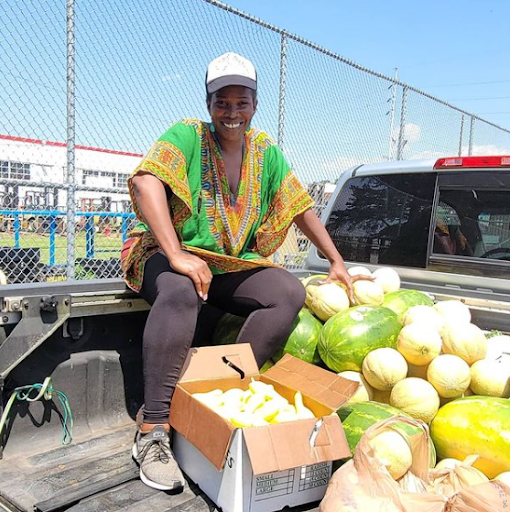Today, I write to you in celebration of partnership and collaboration. I was attracted to the work here at Food Recovery Network, and my specific role as Manager of Stakeholder Engagement, because of the opportunities to collaborate with a variety of people and organizations all collectively committed to one central movement to end hunger and mitigate climate change.
At Food Recovery Network, our model is collaborative, student-driven, and community-centered. Aligned with these practices, we recognize that community members and those closest to individuals impacted by hunger are best suited to serve their own communities. As an organization working across the U.S., with the opportunity to have a deep impact in communities where we have student-led chapters and food business partners, it is important for FRN to be specific in our contribution to each community.
FRN student volunteers from Case Western Reserve University’s FRN chapter recover and donate surplus food to their hunger-fighting nonprofit partner, St. Matthew’s.
To achieve a community-centered model, FRN ensures that each student-led chapter and food business partner has the autonomy to design and implement their food recovery program so that it can fit the unique needs and capacities of their own community. In turn, our student-led chapters and food business partners connect with and donate their recovered food to local, hunger-fighting organization(s) that serve individuals experiencing hunger in their community.
Volunteer at The Community Kitchen serves a meal to individuals experiencing hunger. Photo Credit: The Community Kitchen, Olympia, WA
These organizations are shelters, soup kitchens, afterschool programs, veterans centers, and community centers that serve the local community in various ways, including by distributing recovered food. Through partnership with these organizations, FRN chapters' food donations reach people experiencing homelessness, children and youth, students, unemployed or underemployed individuals, older adults, veterans, people with disabilities, immigrants, and other under-resourced groups experiencing hunger. This network of more than 300 hunger-fighting organizations that help to support the 42 million people experiencing hunger in the U.S. is vital to the work of FRN.
“We are grateful that we’re able to receive food from their dining halls, that not only keeps food out of the landfill, but allows us to give it to those who need it. And at the same time, we’re able to support the pantry that is on the campus as well. It’s a partnership where we help each other by supporting each other.”
Recently we launched our 2022 partner agency survey to better understand and respond to the gaps and needs of our hunger-fighting partners and the constituents they serve.
If you are a hunger-fighting organization that partners with an FRN chapter or food business partner, please take 5 minutes to fill out our Partner Agency Survey and FRN will make a $50 donation to your organization to support the great work you are doing in your community.
FRN uses the data from our partner agencies to help ensure that our programming is attuned to supporting our community partners, always. For example, year in and year out, when FRN asked how we could best support our hunger-fighting partners beyond donating surplus food, they indicated a need for additional funding for their community programs.
In response, FRN began to identify and implement ways we can route funds directly to our hunger-fighting partners. Last year, FRN ran a virtual fundraising campaign that raised $6,351 for a selection of our hunger-fighting partners across the country. This year, in addition to donating funds to our partners who complete the survey, FRN has launched a bi-annual Partner Agency Newsletter that is packed with targeted funding opportunities, resources, and more. FRN has also encouraged our FRN chapters to host fundraisers on behalf of their hunger-fighting partners to help engage the local community and students in supporting these organizations.
Mwandisha Gaitor, Culinary Creator and Owner of 2 Pieces of Toast, distributing gleaned produce from 5 As Veggies & Produce as part of FRN’s Atlanta Gleaning program.
Besides funding, our partners have also continually expressed a need for fresh produce for their hunger-fighting programs. In response to this request, FRN deepened and expanded our gleaning work in select communities across the country, including Atlanta, GA and Irvine, CA. Gleaning is the act of harvesting excess fresh produce from farms, gardens, and farmers' markets and donating it to hunger-fighting organizations. In the coming year, we will continue to build upon these gleaning programs and work with select FRN chapters who glean to identify the most scalable ways for our chapters across the country to route more fresh produce to partner agencies in their communities.
“Because of the quality of food that we receive, families are eating healthier and getting well-balanced meals....with few, if any, additions.”
FRN student volunteers at Georgia Tech recovering surplus food to feed local communities experiencing hunger throughout Atlanta.
As pillars of support for communities, as well as a backbone of FRN programs, our hunger-fighting partners are vital to the success and impact of our work to end hunger, every day.
As an individual committed to helping people always, I am grateful to be in partnership with these organizations and people who serve their communities so diligently.
If you are a hunger-fighting organization seeking food donations, please contact our team at programs@foodrecoverynetwork.org and we would be happy to assist you.






